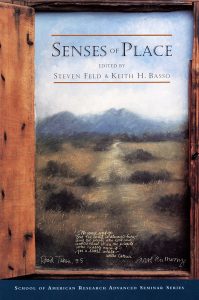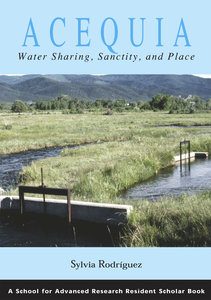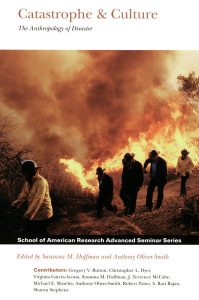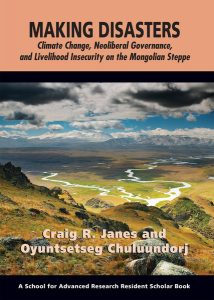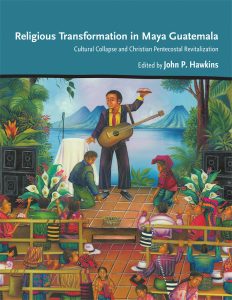When life seems to be changing day by day, if not hour by hour, we look to sources of information that we have come to know and trust. Books like those published by SAR Press comprise resources that readers can return to again and again, not only for the most current thinking, but also for the long view: histories that help us to interpret events past and present so that we can work together toward a better future.
Along with soaring temperatures and trips to the swimming pool, summer in the US Southwest now inevitably brings fire, as our bright blue skies turn hazy with smoke from forest fires throughout the West. Of course, fire has always been part of the landscape, but as the climate changes, our relationship to fire changes, too. In it we may see a portent of summers—or even years—to come.
In Acequia, Sylvia Rodríguez writes not about fire, but about water, and specifically the acequias, or community irrigation systems, used by the people of northern New Mexico for hundreds of years:
Water scarcity and the legal status and ownership of water and water rights are major world issues in the 21st century. The acequia associations of New Mexico, like other local water-use and water-sharing communities around the world, are caught in a dilemma: the legal transition of water as a substance to which all humans have a right, to water as a commodity available to the highest bidders. This worldwide crisis magnifies their significance as an example of a workable, even elegant solution to the age-old problem of dividing water where it is scarce.
Rodríguez shows how water and its management have long shaped every aspect of life in these communities, from the secular to the sacred. But as we think about these relationships in the context of drought and urbanization, as we think about our relationships with environment, landscape, and place, we must also think about change.
Below you’ll find a list of books describing how environmental change affects people with deep roots in New Mexico, Guatemala, Mongolia, and elsewhere around the world, along with a few others on related subjects.
Acequia: Water Sharing, Sanctity, and Place
Sylvia Rodríguez (SAR Press, 2006)
“The story told in these pages is born out of the struggle of acequia systems to survive in a world where water scarcity and competition are no longer local issues but part of a global crisis. Small farmers and ranchers in New Mexico are fully immersed in the urban wage economy, and few subsist exclusively or primarily by agriculture. Yet in communities in Taos, Río Arriba, Mora, and other northern counties, people still clean their ditches and irrigate, and ditch associations increasingly mobilize and litigate to defend their water rights against competing claims and demands. The regional pressures that face them include population growth, urbanization, and industrial or resort development, all of which require ever greater amounts of water—water that most city dwellers comfortably assume will be transferred for their needs and out of agricultural use.”
Catastrophe & Culture: The Anthropology of Disaster
Susanna M. Hoffman and Anthony Oliver-Smith (editors, SAR Press, 2002)
“Disasters are playing a growing role in shaping the social and cultural fabric of the human condition. Disasters include global changes that are brought on by human abuse of the biosphere and compounded by demographic realities of an expanding world population. As human populations expand, stressing available resources, they enter into new and often precarious states with their environments that increase risk and leave many vulnerable to disaster. Meanwhile, developed economies put marginal human populations and environments at risk as they strive to increase productivity and create new markets for the juggernaut of world capitalism.”
How Nature Works: Rethinking Labor on a Troubled Planet
Sarah Besky and Alex Blanchette (editors, 2019)
“Across mainstream American political discourse, there is an enduring—and even intensifying—faith in the value of human labor at the exact moment when its capacity to organize society and mitigate environmental ills has never been more in question. . . . This book is therefore written at a moment of apparent global transition when the meaning and value of work is in flux—and with it, perhaps, long-standing interpretations of what it means to lead a life well lived. It is not at all clear, however, what a future world without work might entail. Rather than forecasting fixed futures of work (or worklessness), then, we take utopian visions of abundance and stories of looming ecological disaster themselves as objects of analysis. The chapters of this volume describe fragile present-day worlds of work where no one certain end is inevitable.”
Making Disasters: Climate Change, Neoliberal Governance, and Livelihood Insecurity on the Mongolian Steppe
Craig R. Janes and Oyuntsetseg Chuluundorj (SAR Press, 2015)
“Understandably, then, winter disasters are a major environmental and policy issue in Mongolia. The dzud is not just an unfortunate event that affects a few thousand isolated rural herders; it is arguably the most important driver of chronic poverty in the country as a whole. But the reasons offered for why the dzud, which is, after all, a well-known and understood climate hazard, and one with which Mongolian herders have had to cope for centuries, should now produce such extreme levels of suffering are complex and to some degree contested by experts and policy-makers. . . . It is our argument here that analysis of the disasters encompassed by the term ‘dzud’ provides a critical lens through which one can ascertain the contradictions and conflicts that have compromised Mongolia’s efforts at social and economic development since 1990.”
Religious Transformation in Maya Guatemala: Cultural Collapse and Christian Pentecostal Revitalization
Edited by John P. Hawkins, with a foreword by John M. Watanabe (SAR Press, 2021)
“This shortage of a cultural essential [corn] has produced a crisis of cultural faith in a society that ideologically, relationally, and symbolically centers on corn as the key life-giving substance. With the increasing cultural crisis brought on by land and corn insufficiency has come a crisis regarding family and municipal autonomy as well as the increasing irrelevance of those religious ideas, symbols, and practices that connect to corn and autonomy and have represented and guided Maya residents in this colonized society. In a word, corn and land crises led to cultural crisis; cultural crisis led to religious crisis; and religious crisis has, ultimately, precipitated religious change on a massive scale.”
Related titles from SAR Press:
- Globalization, Water, & Health: Resource Management in Times of Scarcity, edited by Linda Whiteford and Scott Whiteford, 2005
- Indians & Energy: Exploitation and Opportunity in the American Southwest, edited by Sherry L. Smith and Brian Frehner, 2010
- Timely Assets: The Politics of Resources and Their Temporalities, edited by Elizabeth Emma Ferry and Mandana E. Limbert, 2008
Register now for the next event in our Senses of Place Summer Series: “Places: Aesthetics and Meaning of Special Settings in the Andean Past and Present.”
Find out more about SAR Press and order any of our books.
SAR has been publishing scholarship of the highest caliber for over one hundred years.


